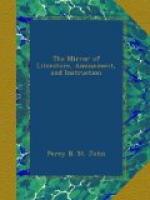Vixtrix causa Diis placuit, sed victa Catoni.
Cato was faithful to the sacred cause of liberty, and disdained to survive it; and now for the fiddle. In the days of good Queen Bess, when those who had borne the iron yoke of Mary, ventured forth and gloried in that freedom of conscience which had lately been denied them, a jolly innkeeper having lately cast off the shackles of the old religion, likened himself to the old Roman, and wrote over his door l’Hostelle du Caton fidelle. The hostelle and its sign lasted longer than the worthy gentleman, and having gone shockingly to decay, was many years after re-established. But alas! the numerous French words once mixed with our language had vanished, barbarized, and ground down into a heterogeneous mass of sounds; and le Caton fidelle was no longer known to his best friends when resuscitated under the anomalous title of the Cat and Fiddle!!
XX.
* * * * *
THE BLIND GIRL.
(For the Mirror.)
As fair a thing as e’er was form’d of clay.
BYRON.
Sweet wanderer—we have known
her long!
And often on our ear,
Has gush’d the cadence of her song,
As if some stream were near.
Her path was through our tranquil dell,
When breezes kiss’d the curfew bell.
We gaz’d upon the golden hair,
That o’er her white
brow shone,
And beauty’s tinge had cluster’d
there,
A grace unlike its own.
We call’d it beautiful—that
brow!
But rayless were the eyes below.




